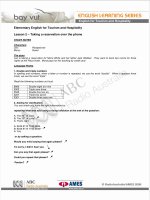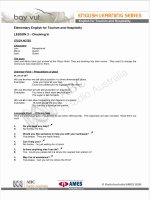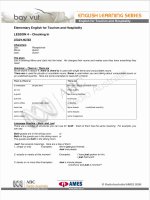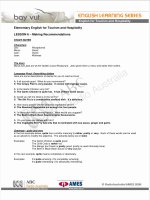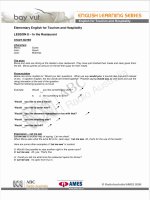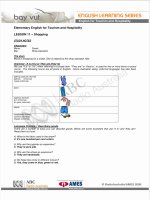english for hotel and restaurant workers
Bạn đang xem bản rút gọn của tài liệu. Xem và tải ngay bản đầy đủ của tài liệu tại đây (2.12 MB, 20 trang )
Professional Spoken English for
Hotel & Restaurant Workers
Most Practical Spoken English Guide for Non
Native English Speaking Hotel, Restaurant &
Casino Workers and Hospitality Students
Hotelier Tanji
Owner
www.hospitality-school.com
Copyright © 2014 Hotelier Tanji
All rights reserved.
ISBN:
ISBN-13:
THANK YOU..
Hotelier Tanji is the owner of www.hospitality-school.com,
world’s one of the most popular free hotel & restaurant
management training web site running from 2010. She and her team
run the website to share free hospitality management learning
experience all over the world. Thanks for purchasing this book. It
will inspire us to work harder with utmost consecration.
Table of Contents
No
Name of the Chapters
Page
Part-1: Basic Spoken English
1
2
3
4
5
6
7
8
9
10
11
12
13
Know your Surroundings
Meet the Guests
Guest Courtesy
Time, Days & Dates
Describing Hotel Facilities
Telephone Courtesy
General Expressions
Ask your Guest
Dealing with Guest Requests, Complaints &
Problems
Giving & Receiving Complements
Directions, Locations & Transportation
Offering Help or Assistance
Making Comparisons
1-8
9-21
22-30
31-37
38-42
43-56
57-62
63-72
73-85
86-90
91-96
97-107
108-111
Part-2: Spoken English for Specific
Departments
14
15
16
17
18
19
20
English for Human Resources Department
English for Business Centre
English for Accounting Department
English for Food & Beverage Department
English for Front Office Department
English for Housekeeping Department
English for Sales & Marketing Department
113-117
118-122
123-134
135-148
149-175
176-192
193-199
Professional Spoken English for Hotel & Restaurant Workers
PREFACE
Professional Spoken English for Hotel & Restaurant Workers, 1st edition is a selfstudy practical Spoken English training guide for all nonnative English speaking hotel,
restaurant, casino workers and hospitality student who want to accomplish a fast track,
lavish career in hospitality industry. www.hospitality-school.com, world’s most popular
free hotel & restaurant management training blog publishes this book with an aim that
after going through this book, a reader will be able to use the language for communication
in different day to day life situation in any part of hospitality sector – both orally and
written.
The book on “Professional Spoken English for Hotel & Restaurant Workers”, 1st
edition consists of the subjects that will enable the readers to learn English for the
practical usage and at the same time, they will get exposure to the real life experience in
different fields related to their current & future job. The language used is very smooth,
easy and effortless that anyone using the book will definitely be benefited by using this.
The book covers most of the situations someone needs to use English in his job with hotel,
restaurants, kitchen, front office, travel agency, tour operator’s office, etc. The book will
help to improve all communications for the users.
I will be happy enough to receive any comment and suggestions from the readers of the
book to alter for a better publication in the future.
Regards
Hotelier Tanji
Owner & Admin
www.hospitality-school.com
ev
ie
w
C
op
y
Know your Surroundings
1.1 Introduction
Pr
In a large hotel many employees work for different functions and purposes. Each one
has a specific role to play in order to fulfill the needs of the guests. When a staff is
recruited then hotel authority provides detail job description that lists all the duties
EE
and responsibilities the staff has to perform. A guest may never ask a staff to describe
their job duties, but if they do, you should be prepared to give a simple answer.
FR
Relevant Expressions
Asking about a person’s occupation
What do you do?
What's your job?
What's your occupation?
PAGE
1
What do you do for a living?
Inquiring about Job Duties
What are your job duties?
y
What exactly do you do?
op
What does your job entail?
Guest: What do you do?
Staff: I'm an event coordinator for a hotel.
C
Dialogue-1:
w
Guest: What exactly does an event coordinator do?
Staff: Well, we arrange and set up all the things needed for organizing a meeting and
ie
conferences for various groups. Our main job is to ensure that everything runs
smoothly and efficiently during the event. For example, we schedule rooms, arrange
ev
for setting up of any needed equipment required (such as audio-visual equipment,
microphones, etc.) and solve problems that may rise up.
Pr
Guest: Oh that really sounds interesting.
Staff: Interesting but sometimes it’s quite difficult to manage everything.
EE
Dialogue-2:
Guest: What do you do in this hotel?
Staff: I am a bell man here.
FR
Guest: So you take people's luggage to their rooms. Am I right?
Staff: Yes sir, but I also arrange things like hiring taxis for guests. Beside that I have a
prime duty. I provide a lot of information to guests. For example, what facilities we
have in this hotel, information about surrounding places, best places to eat in the area,
and places to go and see etc.
Guest: Just out of curiosity- Please don’t mind. Do guests tip well?
PAGE
2
ie
w
C
op
y
Meet the Guests
ev
In hospitality industry, as an hotelier or restaurateur, every day you have to meet with
many guests. According to different time and situation, you have to greet and
Pr
introduce the guests. In this chapter you will learn some essential expressions and
styles you should use to greet a guest, response to any expression or give farewell to
guest with courtesy etc.
EE
2.1 Greeting Guest
To ensure guest repetition and to make long lasting relationship it is very much
indispensable to make good first impression to guests as it is said that first impression
FR
is that last impression. All guests are need to be greeted affably after their arrivals at
the hotel by an hotelier.
Here are some standard vocabularies, phrases and
expressions that can be used to greet the guests.
PAGE
9
Useful Vocabulary
These are some widely used vocabularies that you can use to greet the guests:
Trip
Satisfaction
Identify
Look forward to
Greet
Enjoy
Pleasure
op
Essential Expressions
y
Welcome
C
There are some magic expressions to greet guests and response to any greetings.
Generally people use these words according to the level or gravity of relationship with
w
the person he or she greets and timing of the greeting. You should remember that
there are some expressions which you should not use in formal situations like
ie
greeting a guest. These are called informal greetings. You can only apply these
expressions with your closest friends or colleagues. In contrast, it may sound odd if
ev
you use very formal words with your closest friend or relative. So, closely look at
these expressions and try to understand which expressions you should use in which
restaurant.
Pr
situation. Remember, in most cases, “Formal Expressions” should be used in hotel &
When you Meet Someone
EE
Expressions Types
FR
Formal Expressions
Semi Formal
Expressions
Informal Expressions
Greeting Words
Good Morning
Good Afternoon
Good Evening
Hello
How are you?
How is life
Hi
So, What’s Up
What’s new
Long time no see
Responses
Good Morning
Good Afternoon
Good Evening
Hello
Fine, Thanks and you?
Nice/
Nothing Special
Hi
As always
Nothing
Yeah
PAGE
10
Note: You should use these expressions when you first meet with any guest or
colleague. Usage of these expressions will vary according to the situation and the
person with whom you are talking. For example:
You cannot say good evening, in the morning!
y
Again, with a new guest you should not say “Long time no see” or may be even
op
“What’s up”.
Also in hotel, you should use only formal expressions, but again only in limited
cases and with repeated guests you may use semi-formal expressions. It will
w
So, you should think before using any expression.
C
depend on the situation and relation with the guest.
Timing:
ie
Often we cannot understand what expressions we should use in formal meetings. This
ev
happens because we are not sure about the timing. Here is a tip:
: From 12.01 Am to 11.59 Am
Say “Good Afternoon”
: From 12.00 Pm to until sun set
Pr
Say “Good Morning”
Say “Good Evening”
EE
Example:
: From Sunset to 12.00 PM
: Good Morning
10.25 PM
: Good Evening
3.00 PM
: Good Afternoon
FR
10.25 Am
3.00 AM
: Good Morning
Quick Tip
Never use “Good Night” at night when you meet with a person. It is used
for leaving. You should use “Good Evening” when you meet at night.
PAGE
11
ie
w
C
op
y
G u e s t Co u r t e s y
ev
To ensure highest level of service, all guests should be treated in a courteous manner.
As an hotelier your major responsibility is to ensure guest’s satisfaction and show
Pr
concern towards the guests. To do so, pay attention in great details of guest’s
requirements and always look for ways to help guests or colleagues.
EE
3.1 Request & Replies
Useful Vocabulary
Over there
Mind
Look for
Favor
Reply
Next to
Do somebody a favor
Easy
Request
Problem
Trouble
FR
Please
PAGE
22
Essential Phrases
Expressions for Request
Could you … please?
Could you spell your name, please?
Would you please do me a favor?
Could you do me a favor?
C
Could I ask you a favor?
op
Would you mind giving me your credit card, please?
y
Would you mind … please?
Could you do a favor for me?
Of course.
Sure.
No problem.
ev
Expressions for Replies:
ie
w
Could you possibly do a favor for me?
I’d be glad to.
It’s would be my honor.
Of course, I will.
Pr
No trouble at all.
EE
Dialogue
Guest: Excuse me.
Staff: Yes?
FR
Guest: Could you please do me a favor?
Staff: Certainly. What can I do for you, sir?
Guest: I’m looking for the Sales Department.
Staff: No problem. In fact that’s easy. It’s over there, next to the Information Desk.
Guest: Oh I see. Thanks a lot.
Staff: My pleasure.
PAGE
23
3.2 Thanks & Replies
Useful Vocabulary
Pleasure
Welcome
Glad
As soon as possible
Help somebody with something
By the way
Indeed
Trouble
Appreciate
op
C
Relevant Expressions
y
Thanks
Thank you.
ev
Thank you very much.
ie
Thanks.
w
Expressing Thanks
Thank ever so much.
Many Thanks.
Pr
Thank you for your kindness.
Thank you for your trouble.
You are so kind.
EE
It’s my pleasure to serve you,
I appreciate your kindness.
I’m very grateful to you.
FR
That’s very kind of you.
Accepting Thanks
You are most welcome.
You’re welcome.
PAGE
24
ev
ie
w
C
op
y
English for Food & Beverage Service
De part m e n t
Pr
Restaurant & Kitchen Staffs
A. Restaurant Reservation
EE
Useful Vocabulary
Please
People
Available
Smoking
Full
Non-smoking area
Booked
Name
Time
Room number
Table
Telephone number
Reservation
Spell
Suitable
FR
Seat
PAGE
135
Preference
Relevant Expressions
1. Taking a table reservation
y
When would you like your table to be reserved?
A table for how many people?
op
Where would you like to seat?
Is it smoking or non-smoking area?
Could you spell your name, please?
May I have your room number, please?
C
May I have your name, please?
w
May I have your telephone number, please?
ie
I’m afraid the table is not available at that time. But we can arrange a seat for
you at ……
ev
I’m afraid we’ve fully booked today.
Would you like me to make a reservation at another restaurant for you?
Pr
2. Greeting and seating customer
Good evening. Do you have a table reservation?
Would you please come this way?
FR
EE
Could you please come with me?
Come with me, please.
Is this table alright?
Is this table suitable for you?
Is this table of your liking?
PAGE
136
Dialogue
Scene 1
Restaurant Staff: XYZ Restaurant. Tom speaking, may I help you?
y
Caller: Yes, I’d like to book a table. What time do you serve, usually?
22.00, sir.
Caller: Right... Are you open every day?
Caller: Can I book a table for Sunday, then?
C
Restaurant Staff: That’s correct, sir. We open every day.
op
Restaurant Staff: We serve lunch from 11.00 to 15.00 and dinner from 17.00 to
Restaurant Staff: Certainly, sir. How many people is it for?
w
Caller: For 11 people.
Caller: For two o’clock.
ie
Restaurant Staff: And for what time, sir.
ev
Restaurant Staff: May I have your name, please?
Caller: James Morrison. It’s J-a-m-e-s M-o-r-r-i-s-o-n
Restaurant Staff: The table for 11 people on Saturday at 1 p.m. Thank you very Much,
Pr
Mr. James Morrison. Goodbye.
Scene 2
EE
Service Staff: Good evening, sir. Welcome to XYZ. Do you have a table reservation?
Guest: No. I’m afraid not.
Service Staff: It’s ok. Don’t worry. Would you like a table in smoking or non-smoking
FR
area?
Guest: Non-smoking, please.
Service Staff: Please come with me………. Is this table alright?
Guest: It’s absolutely perfect.
Service Staff: Would you care to take a seat? Please allow me (to pull back a chair)
PAGE
137
ie
w
C
op
y
English for Sales & Marketing Department
ev
Customer Relations
Sales
Pr
Useful Vocabulary
Attitude
Decision
Marketing
Salesperson
Objectives
(More) detail
Convenient
Client
Professional
Customer relations
Request
Modifications
Appointment
Catalogue
Representative
Assistance
FR
EE
Confirm
Needs
PAGE
193
Mr. Nicolas Robert: I’m fine. Please have a seat. We last talked on the phone, didn’t
we? That was some time ago.
Guest: Yes, it was about the Conference. Our company, HP, wants to hold a conference
in your hotel.
Guest: On March 20th and we would like to start at 11AM.
y
Mr. Nicolas Robert: On which day?
op
Mr. Nicolas Robert: That is all right. How many persons will attend the conference?
Guest: About 135 persons.
Mr. Nicolas Robert: Would you also like to have lunch in our hotel?
C
Guest: Yes, if that is possible?
Mr. Nicolas Robert: Sure. Why not? What kind of lunch would you like to have?
w
Buffet or a la carte?
Guest: Definitely we will prefer buffet lunch, because we’ll be with a lot of people.
ie
Please arrange special separate place for us at your restaurant.
Mr. Nicolas Robert: That is possible. We can book a banquet room for you. By the
ev
way, do you need any room reservation for your guests?
Mr. Nicolas Robert: That is a very good idea. I haven’t thought about that yet. I will
Pr
send you a list of the guests who want to spend the night in your hotel as soon as
possible. So I will try my best to get that information for you. What facilities do you
offer for my guests?
EE
Guest: As you know, as a renowned five start hotel, we have all top class facilities. We
have a fitness center, a hair salon, a swimming pool, a Chinese restaurant, a western
restaurant, and a coffee shop. I will give you a brochure. The brochure tells you
FR
everything about this hotel.
Mr. Nicolas Robert: Thank you very much for your time. I am looking forward to
coming to your hotel and I will send you the list of the guests as soon as possible and
fix the price and other formalities.
Guest: Thank you. This is my card. Feel free to call me whenever you need.
Mr. Nicolas Robert: Good-bye
PAGE
195
Selling & Marketing a Product
Design
Benefits
Attractive
Threats
Responsible
Profit
Personal selling
Promotion
Trustworthy
Image
Features
Opportunities
Timing
Rehearse
Competition
w
C
op
Product
Cost-effective
Superior
Customer-oriented
ev
Confident
Present a package
ie
Suitable
Distribution
y
Useful Vocabulary
Production-oriented
Relevant Expressions
Pr
Our product is the least expensive on the market.
Our product is very reliable.
We feel our product is much more attractive.
EE
Our product has many features.
Consumers prefer our product.
FR
Our customers are concerned competitors with quality.
We believe our product is superior to theirs.
Price is important, but certainly so is quality.
The product must be beneficial.
We’ll send you a catalogue (brochure) of our products.
There is an enormous demand for our product.
PAGE
196
Our Current Training Manuals
ev
ie
w
C
op
y
Food & Beverage Service Training Manual with
225 SOP
Hotel Front Office Training Manual with 231
SOP
Hotel Housekeeping Training Manual with 150
SOP
170 Hotel Management Training Tutorials
Professional Waiter Training Manual with 101
SOP
Hospitality Career Opportunities: Learn Secrets
to Get Job in Hotel, Restaurant & Cruise
Industry
Professional Spoken English for Hotel &
Restaurant Workers
Pr
Our Upcoming Training Manuals
FR
EE
Professional Business English for Hotel &
Tourism Industry
Effective Guest Complaint Handling Techniques
in Hotel & Restaurant
Hotel Room Service Training Manual
Visit www.hospitality-school.com for all Free
Tutorials, updates, manuals & many more
--- THE END --PAGE
200

